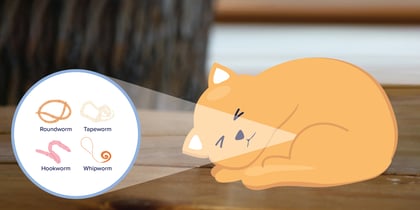Heartworm Prevention for Cats: What You Need to Know

Table of Contents
We all want our beloved cats to live healthy, vibrant lives. That's why it's crucial to be aware of the lurking danger of heartworm disease. In this comprehensive guide, I’ll explain the ins and outs of heartworm in cats, from its causes and transmission to prevention and treatment strategies.
Arm yourself with the knowledge and tools to safeguard your feline companion's well-being and ensure a heartworm-free life.
Key Takeaways:
- Heartworm disease in cats is caused by transmitting heartworm larvae through mosquito bites.
- There is no FDA-approved treatment for heartworm disease in cats, and the medication used for dogs can be toxic to cats.
- Prevention is crucial, and monthly heartworm preventatives prescribed by a veterinarian are recommended for indoor and outdoor cats.
What is Heartworm in Cats?
Heartworm in cats refers to an infestation of long hair-like worms that can multiply and block a cat's heart and pulmonary arteries. This can lead to severe health issues and even death. Unlike in dogs, there is no FDA-approved treatment for heartworm disease in cats, making prevention crucial.
What Causes Heartworm Disease in Cats?
Heartworm disease in cats is caused by the transmission of heartworm larvae through the bite of an infected mosquito. When a mosquito carrying these larvae bites a cat, the larvae are introduced into the cat's bloodstream, where they migrate and develop into adult worms. This can lead to damage to the cat's heart and lungs. It's crucial to be aware that even indoor cats can be at risk as mosquitoes can enter the home and transmit the disease.
Related reading: How Are Cat Diseases Transmitted?
Signs & Symptoms of Heartworm in Cats
Cats often have no visible symptoms of heartworm disease, making it difficult to identify in the early stages. Some cats with heartworm disease may initially have very subtle signs, which gradually worsen over time. Common signs of heartworm in cats include:
- Asthma-like attacks
- Coughing
- Lack of appetite
- Weight loss
- Vomiting
- Difficulty walking
- Seizures or fainting
- Fluid accumulation in the abdomen.
- Unfortunately, affected cats will often act normally until they suddenly collapse or pass away.
If you notice any of these heartworm symptoms in your cat, promptly schedule a visit with your veterinarian. Your veterinarian will perform a thorough wellness exam and obtain a full medical history.
Testing for Heartworm in Cats
The American Heartworm Society recommends that cats be tested for heartworms once per year. This test can be done through a simple blood test your veterinarian will perform. Since cats with access to the outdoors have greater potential exposure to mosquito bites, this is especially important for them, but please remember that mosquitoes can and do enter homes, so no cat should be considered completely safe from heartworm disease.
Even cats on preventative medications must still be routinely tested for heartworm, as no medication is 100% effective in preventing heartworm in cats. To test for heartworm disease, your veterinary doctor must only draw a small blood sample.
Treatment for Heartworm in Cats
Cat heartworm prevention is essential, as no drug is approved to treat this condition in cats. The medication used to treat canine heartworm disease is extremely toxic to cats, causing serious and often fatal side effects.
Therefore, once a cat has heartworm disease, the only treatment option is surgical removal of the worms. This is a specialty surgery that carries serious risks, so it is uncommonly performed. It is much more likely that your veterinarian will suggest a long-term management plan to help make your cat as comfortable as possible.
How to Prevent Heartworm in Cats
Preventing heartworm disease in cats is achieved by using monthly preventatives. Cats (both indoor and outdoor) should be on monthly medications that your veterinarian can prescribe.
Medications to prevent heartworm in cats come in topical gels or chewable tablets that must be administered monthly. Unlike in dogs, there is not yet an FDA-approved heartworm prevention shot for cats.
During your pet's wellness exam, your veterinarian will discuss the best heartworm prevention methods for your cat's needs and the proper medication administration. Medications must be given properly and on time to achieve the most benefit. Heartworm prevention medications are not available over-the-counter.
Speak with BetterVet About Heartworm Prevention for Your Cat
Cat heartworm is often misunderstood by pet owners, who believe this condition only affects dogs. However, all cats should be protected against heartworm with preventative medication and annual blood testing for heartworm. Even if your cat is exclusively an indoor cat, protecting them from this catastrophic disease is vital.
Ready to get your cat started on preventative heartworm medication? Book an appointment to discuss a treatment plan to keep your furry friend happy and healthy. BetterVet offers convenient in-home visits, where a trusted BetterVet veterinarian will visit your home - no stressful cat carriers or car rides required!
Your veterinarian will ensure that your pet is up-to-date with all necessary vaccinations and perform routine blood work where your feline is happiest and most relaxed - your home and partner with you to help keep them healthy for years.
Frequently Asked Questions
How can an indoor cat get heartworm?
Heartworm disease is still a real concern for indoor cats. Indoor cats living in apartments may roam onto a deck or balcony at times, where they may be susceptible to mosquito bites. During the summer months especially, mosquitos can also enter the home and put indoor cats at risk for heartworm.
How do cats get heartworms even if they're not ideal hosts?
Cats are not natural heartworm hosts, making them less susceptible to heartworm infections than dogs. This is because heartworms cannot thrive as well inside a cat's body. When larvae enter a cat, they often die before they become full-grown adult heartworms.
Although not typical, it is still possible for heartworms to develop in a cat's body, leading to disastrous consequences. Since all cats with heartworm disease eventually pass away, they should be protected appropriately using preventative medications.
When should my cat start heartworm prevention medication?
Kittens are at the same risk of heartworm as adult cats. As such, it's recommended that kittens begin heartworm prevention medication around two months of age. Your kitten's veterinarian will determine a safe and appropriate dose of heartworm prevention medication based on their body weight.
As your kitten grows, the medication dosage must be adjusted accordingly. Never use dog heartworm, flea, or tick preventives on cats, as this can be extremely dangerous and life-threatening. A single drop of certain canine topical medications can be fatal to a cat.






